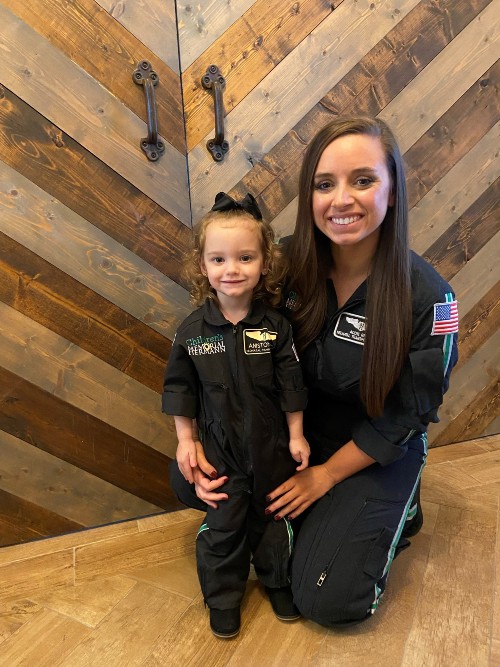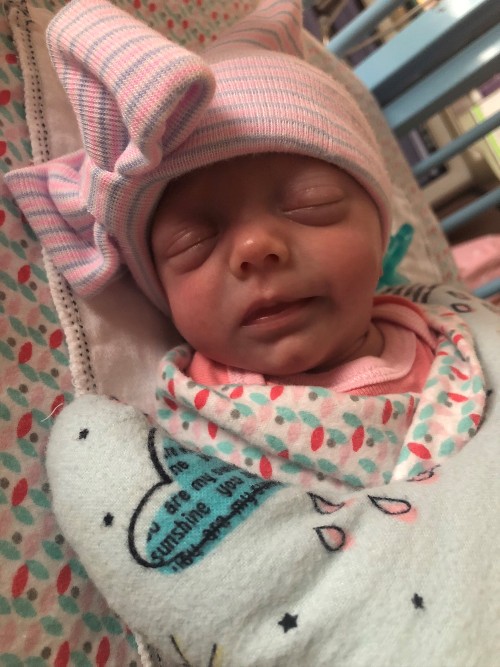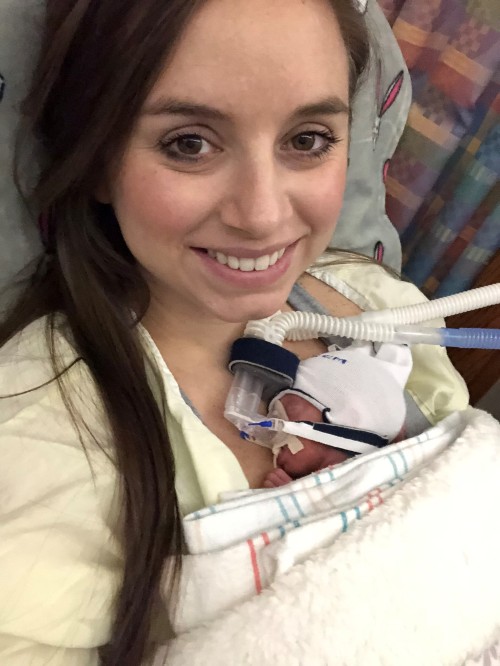
After working her three nights in a row in the NICU, Addie started seeing swelling in her feet. Thinking it was just temporary swelling from standing on her feet so long, she went to see her obstetrician, Dr. Michael Piegari at Memorial Hermann Medical Group OB/GYN Texas Medical Center for a checkup.
“At my appointment, I had an ultrasound, and Dr. Piegari told me that my baby was measuring small and had intrauterine growth restriction (IUGR),” said Addie. Dr. Piegari diagnosed her with preeclampsia and reverse in diastolic flow, which means the baby wasn’t getting the adequate blood flow she needed to grow properly.
“Preeclampsia is a potentially very dangerous progressive disorder in pregnancy that starts out with elevated blood pressure and can eventually lead to multiple organ dysfunction in the mother as well as growth restriction and preterm delivery in the fetus,” said Dr. Piegari.
Addie was immediately taken to Labor & Delivery (L&D) Triage at Children’s Memorial Hermann Hospital in the Texas Medical Center. They told her to be prepared for an emergency delivery.
“Luckily my mother-in-law was with me so I wasn’t alone, but I was still panicking. I called my husband, he was teaching a class, but left immediately to come be with me,” said Addie.
Meanwhile, Dr. Piegari and the medical staff at Children’s Memorial Hermann Hospital did all they could to prolong the pregnancy.
Right away, the medical staff put Addie on medication to try to reduce her blood pressure and prevent seizures. The medication is not only to help the mother, but also help and protect the baby’s brain. She had daily ultrasounds to check the baby’s growth. They also gave her medication to help boost the baby’s lung growth.
“It brought my blood pressure and some swelling down. I knew that if it kept working, I could stay pregnant a little longer, which means so much for an IUGR baby,” said Addie.
“We managed to keep her pregnant until 28 weeks and 6 days, when her condition worsened and necessitated delivery,” said Dr. Piegari.
Addie’s prior medical experience was both a blessing and a curse in many ways.
“Being a NICU nurse, I know the reality of it. I would get anxious anytime the pressure machine would go off. Every time they’d take my blood pressure, Chase would try to distract me by turning on the TV. Every day was a different obstacle, but I knew every day I could keep her in, the better chance she would have when she got here,” said Addie.
Delivering Aniston
“I could tell I was getting closer to delivery time because my nurse kept coming in and out of my room and waking me up to tell me to breathe. My oxygen saturations kept dropping and she wanted me to take deep breaths to get it to come up. I was so tired. I hadn’t slept in days. They brought in oxygen to help me breathe, and that worked for a little bit, but it ultimately just kept getting worse,” said Addie.
“She had severe range blood pressures and her baby had severe growth restriction,” said Dr. Piegari. “On top of this, the baby developed pulmonary edema (fluid in her lungs) which ultimately led to her being delivered by cesarean section.”
Addie’s condition escalated quickly, prompting the team to deliver baby Aniston as soon as possible and being a NICU nurse herself, Addie was familiar with what was about to take place in order to be ready to deliver a 28-week premature baby.
“I was a nervous wreck knowing what was going to happen or thinking about how small she was going to be. I was stressed because of the delivery in general, but also relieved knowing she was going to be in such good hands. I had such an amazing team of nurses, respiratory therapists, and doctors preparing me and getting ready for my preemie to enter the world,” Said Addie.
The Neonatal Transport Team at Children’s Memorial Hermann Hospital got busy preparing for Aniston’s birth. This unit-based transport team is composed of 28 specially trained RNs and RTs and is responsible for all movement of neonatal patients inside the hospital. These teams attend, on average, 2,000 high-risk deliveries a year throughout the Memorial Hermann Health System. Additionally, the Neonatal Transport Team completes about 350-400 external transports per year via ground ambulance, rotor wing and fixed wing airplane for neonatal patients from community hospitals, clinic and emergency departments when a higher level of care is needed.
On March 12, 2019, Addie was prepped to deliver via cesarean section with Chase holding her hand; Aniston Steele Adamek was born weighing just 1 pound 14 ounces.
Eva Morales, a co-worker of Addie’s and a Neonatal Transport Nurse at Children’s Memorial Hermann who was present at the delivery that day remembers it well, “Aniston came out screaming and crying, which we like! I was able to take her over to Addie and let her meet her new daughter before we took her to the Neonatal ICU.”
Meanwhile, Addie was recovering from her C-section, but she was still having trouble breathing and her blood pressure remained high.
“Preeclampsia doesn’t just go away as soon as the baby is born. I still had blood pressure issues for quite a while and was on medication for about four months after she was born. That was hard for me to deal with, being a patient and having to worry about my own health when all I cared about was getting to see Aniston in the NICU,” said Addie.
NICU and Recovery
Addie stayed in the hospital for four days after the birth. Aniston had a lot of growing left to do in the NICU. She stayed there a total of 56 days.
“I cried every night when I left, but I knew she was where she needed to be. It was so painful leaving. Aniston had to learn how to eat and gain weight. I had a whole new understanding of being a NICU nurse when I became a NICU mom,” said Addie.
Personally, Addie faced another struggle as a new mom – a struggle that many moms of premature babies face.
“I struggled a lot in the beginning after I had her. It was hard for me to bond with her. Our baby was in a box, and we couldn’t take her out. She had the umbilical lines going through her umbilical cord; she was connected to the ventilator, and on humidified air to protect her skin. It’s just hard to bond with your baby like that. The biggest challenge for me by far as a nurse that works in that patient pod all the time, it was hard to turn off the NICU nurse and bond with her as her mom.”
Erin Corley was Aniston’s primary nurse at Children’s Memorial Hermann Hospital and a colleague of Addie. “I wanted Addie to have the peace of mind and security that we would do our best to make their experience as comfortable and reassuring as we could for her, just like we do for all our patients.”
As Aniston grew, Addie was able to do more skin-to-skin holding and create bonding moments like bathing and bottle feeding. She started gaining weight and eating, which meant Addie and Chase could feed her a bottle for the first time.
“I remember the first time we got to hold her swaddled. It was over a month after she was born. That was the biggest deal because that was when we could start envisioning getting to take her home,” said Addie.
That day finally came on May 7, 2019. Aniston weighed 4 pounds when she was able to finally leave to go home. Dr. Piegari was especially glad to see this happy ending.
“That little girl was so tough,” said Dr. Piegari.
Aniston’s nurse, Erin, was excited as well. “The day that Aniston finally got to go home with her mom and dad, I was so happy to be her discharging nurse,” remembers Erin. “I was there when she came to us, and I was there when she graduated from the NICU. It all came full circle and the joy I felt that day, seeing her in her car seat, in the arms of her mom and dad, was indescribable.”
Going Home
“She did great on the car ride home. It, of course, was a torrential rain. We were so excited to let our dog, Millie, meet her sister for the first time. The dog had no clue what to do,” said Addie.
To avoid bringing home infections, Addie and Chase did their best to stay home.
“We were really good at social distancing by the time COVID-19 hit. She’s essentially lived in quarantine her whole life,” joked Addie.
Addie’s mother retired to help take care of Aniston while Addie and Chase went back to work.
“I spent my maternity leave at my place of work, so I felt like I had no time at home with her,” said Addie. “That first year is really an adjustment. We brought her home at two months, but considered her to be a newborn baby.”
It took Aniston a full year to catch up developmentally. All the normal milestones came later than they would if she had been born full-term.
“Right after her second birthday, Aniston was asked to participate in a research study at McGovern Medical School at UTHealth Houston involving former premature babies,” said Addie. The study assessed the neurodevelopment of very low birth weight infants. “She rocked it and I could not have been more proud of my former 1-pound baby.”
Aniston is now 24 pounds, and you’d never know that she had an earlier start in life. She loves playing outside, coloring and is obsessed with princesses.
“She is a princess from the moment she wakes up, until she goes go to sleep. She loves to sing and dance. She loves to take charge of every situation she’s in,” said Addie. “She’s so smart and strong-willed. I also truly believe the NICU made her spunkier than she was going to be. She proves to me just how strong she is all the time.”
Addie says she feels blessed to have been surrounded with such support from her family and her colleagues.
“I can’t thank the staff enough, especially my obstetrician, Dr. Piegari, the Neonatal Transport Team, NICU medical staff, the amazing bedside nurses and all of L&D. All those people saved me as I was going through a very tough situation, always checking on me and making sure I was OK. They made the experience so much more pleasant and made it feasible to get through,” said Addie. “I walked away loving them even more because of all they did for Aniston. We will forever be eternally grateful for the medical staff and the nursing staff. Not to mention, the transport team provided me with such peace and comfort knowing what I was about to go through. I appreciated what they did for me so much that I decided to join them!”
Addie is now with the Neonatal Transport Team at Children’s Memorial Hermann and is expecting baby number two – a baby boy. Now at 27 weeks along, she is taking extra precautions to monitor her symptoms closely with the help of Dr. Piegari.
“The recurrence rate of preeclampsia is somewhere between 25% to 65% and because of that Addie has made a lot of lifestyle changes with this pregnancy. She made her own health and her pregnancy a top priority. She changed her diet around from day one,” said Dr. Piegari. “I started her on new medications. We are following her labs closely. We are monitoring her blood pressure both at home and at work, and she has adjusted her work schedule. I am just so proud of all the lifestyle changes that she has made to potentially prevent getting preeclampsia again.”
Dr. Piegari also offers a bit of guidance for other moms facing the same situation. “For the other mothers that had preeclampsia with a previous pregnancy, the best advice that I can offer would be to meet with your physician before you are even thinking about getting pregnant. It’s always best to have a plan,” advises Dr. Piegari.
Addie says the journey from NICU nurse to NICU mom wasn’t easy but she has no doubt she’s in good hands as Aniston’s little brother prepares to come into the world. Whether early or carried to term, he’ll be right on time.
Learn more about the Neonatal Transport Team at Memorial Hermann »
Learn more about the the NICU at Children’s Memorial Hermann Hospital »

